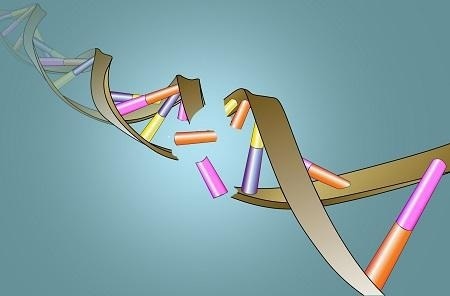Researchers at the Francis Crick Institute, in partnership with Artios, have discovered how an enzyme involved in DNA repair (POLQ) becomes critical to the survival of some tumors when the cancer cells lose the ability to employ a more frequent way of DNA repair.

Image Credit: Francis Crick Institute.
The study reveals a previously unknown role for POLQ in responding to DNA replication stress, laying the groundwork for a Phase I clinical trial examining the impact of inhibiting this enzyme in cancer patients.
Polymerase theta (POLQ) is a DNA repair enzyme that is highly active and specifically upregulated in several types of cancer. According to research, inhibiting POLQ can hinder some cancer cells from repairing their DNA, resulting in cancer cell death.
There are several properties of POLQ that make it an exciting target to explore as a potential Achilles Heel for treating different cancers. POLQ is mainly expressed in cancer cells but is virtually absent in healthy cells. Many cancers become reliant on POLQ to repair DNA damage, a key response important for tumor survival.”
Simon Boulton, Study Senior Author and Principal Group Leader, Francis Crick Institute
Simon Boulton is also the scientific co-founder and VP of scientific strategy at Artios.
The double helix’s two strands are split apart during DNA replication, and each strand is then used as a template to create a new double helix. This process, however, might go awry and result in defects such as the development of gaps in DNA. There are numerous types of DNA repair mechanisms designed to fix these errors and allow replication to proceed normally.
The researchers explored how DNA gaps are fixed in human cancer cells using improved imaging tools that track DNA replication in real time in their study, which was published in Molecular Cell on November 30th, 2022. They discovered that POLQ is a critical repair process in cancer cells that are unable to repair DNA gaps via a common approach known as homologous recombination.
POLQ functions by bridging gaps in DNA, allowing replication to continue and cancer cells to survive. This procedure, however, comes at a cost because POLQ’s gap filling activity is very error prone and results in an increased rate of mutations.
When the researchers suppressed POLQ in cells deficient in homologous recombination (for example, cells with BRCA gene mutations) or in combination with PARP inhibitors, DNA gaps developed, leading to cancer cell death.
A lethal combination?
A research study using POLQ inhibitors is now underway. Artios, a UK and US-based biotech is evaluating a POLQ inhibitor in Phase I clinical studies.
While it is known that blocking POLQ and homologous recombination at the same time hinders DNA repair, our research now provides the scientific foundation to explain how. This mechanistic understanding of how POLQ inhibitors work will help us explore their full potential, including what other treatments they can be combined with and what cancers they are most effective against.”
Ondrej Belan, Study First Author and Postdoctoral Researcher, Francis Crick Institute
Simon Boulton details, “Many cancer cells lose the ability to use homologous recombination, such as when BRCA genes involved in homologous recombination become mutated, and become reliant on repair functions provided by POLQ. Artios is the first to test POLQ inhibitors in the clinic on specific cancer types, and we are hopeful that it can be used more broadly across cancer types.”
A potential tool in slowing cancer evolution
POLQ’s DNA repair process is susceptible to errors, resulting in alterations in cancer cells’ DNA. POLQ-blocking drugs, researchers think, will restrict mutation diversity and its effect on cancer evolution and the development of resistance to cancer treatments.
The introduction of diversity into the genetic make-up of cancer cells makes it more likely that harmful characteristics will arise. This could be adaptation to low oxygen environments, resistance to treatment, or ability to spread around the body. Being able to slow cancer mutation rates and cancer evolution, a process whereby tumors become more advanced and often harder to treat, can be a highly valuable tool for doctors treating patients with cancers.”
Simon Boulton, Study Senior Author and Principal Group Leader, Francis Crick Institute
Source:
Journal reference:
Belan, O., et al. (2022) POLQ seals post-replicative ssDNA gaps to maintain genome stability in BRCA-deficient cancer cells. Molecular Cell. doi.org/10.1016/j.molcel.2022.11.008.